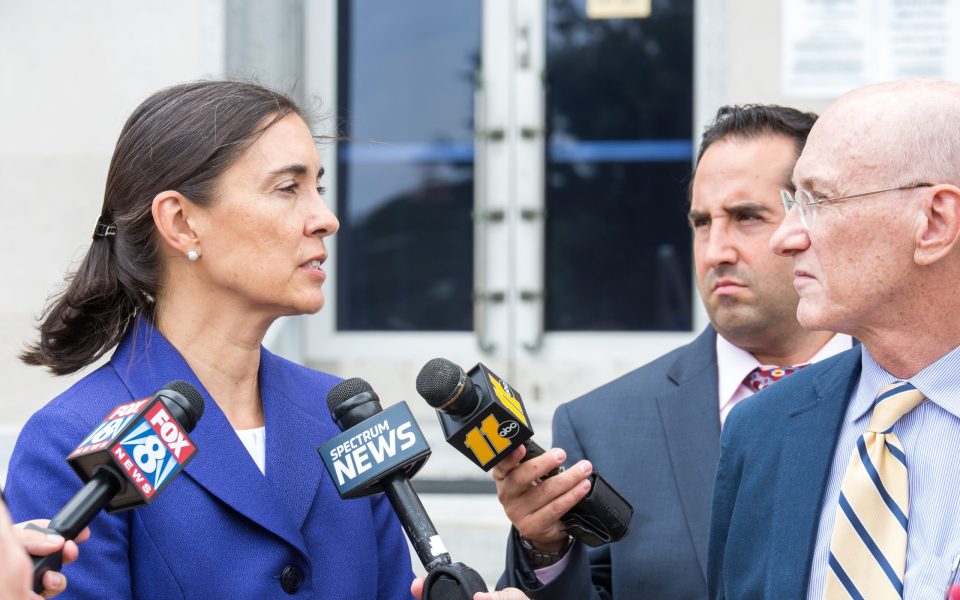Three judges on the 4th Circuit Court of Appeals heard witness testimony and arguments for redrawing racially gerrymandered districts and remedial special elections on Thursday.
US District Court Judge James Wynn scolded state legislative attorneys on Thursday saying that weighing the costs and benefits of redistricting is no longer of concern.
“We want the legislature to do its job,” he said. “We are in the remedy phase now.”
Wynn is a member of the three-judge panel that found 28 state House and Senate districts racially gerrymandered last year and which instructed lawmakers to redraw the unconstitutional maps and to hold a remedial special election. In June, the US Supreme Court swiftly and unanimously affirmed the 4th Circuit Court of Appeal’s decision on racial gerrymanders but remanded the case on the issue of special elections.
Senior Deputy Attorney General Alexander Peters, who represents the state and the State Board of Elections and Ethics Enforcement, did not take a position on a redrawing timeline or a special election but other defending attorneys strongly opposed both the proposed two-week timeline and a special election ahead of the next legislative session.
When Judge Catherine Eagles asked legislative attorney Phil Strach why legislators are advocating for such a drawn-out process, he said their timeline prioritizes public input whereas the plaintiff’s request would compress time for public hearings.
“Well, that’s your own fault,” Eagles retorted.
Eagles and Wynn reminded Strach and his team that legislators could and should have acted on redrawing the maps last year.
“You had to have known the case would be affirmed [by the Supreme Court],” Wynn added.
Legislators only need two weeks to redraw the districts by state law. If defendants fail to redraw by an agreed date, the court must appoint a special master, as occurred in Virginia two years ago, or accept competing maps.
“[Legislators] completely control their calendar and what they do and don’t do. It’s not inadvertent. It’s not an accident.”
Attorney Anita Earls of the Southern Coalition for Social Justice also pointed out that remedial redistricting is a simpler process than what occurs after each Census and that the sole purpose of this redraw is to fix gerrymandered districts, not revise the state’s map.
Earls said the judges must weigh the value of the defendants’ proposed public hearings versus the value of candidates of all parties knowing what district they can run in and of citizens’ capacity for civic engagement, suggesting that the latter are more imperative for a healthy democracy.
“[Legislators] completely control their calendar and what they do and don’t do,” Earls said. “It’s not inadvertent. It’s not an accident.”
Earls’ co-counsel Edwin Speas called Republican’s long delay “a dereliction of duty.”
In the meantime, both Earls and Speas say the situation calls into question the legislature’s ability to do its work and the integrity of the laws it writes. Speas also suggested that “the state legislature may be the most illegally constituted body in the United States, demonstrating a lack of respect for the rights of citizens and for the limitations of that body.”
Judges took testimony and arguments under advisement instead of ruling from the bench.
When defendants further argued that holding a special election would be costly and that voter turnout would be low due to confusion, Earls argued that the real “disruption is in not redrawing maps and not holding special elections” due to the severity and nature of violation.
Former Director of Guilford County Board of Elections George Gilbert testified that during his tenure, the office’s budget was never more than half of 1 percent of the county’s budget and he did not foresee any special elections breaking the bank.
In a press conference, Earls responded to a question on the topic asking, “What price do we put on democracy, and what price do we put on the rights of the voters who’ve been assigned to districts on the basis of their race?”
Join the First Amendment Society, a membership that goes directly to funding TCB‘s newsroom.
We believe that reporting can save the world.
The TCB First Amendment Society recognizes the vital role of a free, unfettered press with a bundling of local experiences designed to build community, and unique engagements with our newsroom that will help you understand, and shape, local journalism’s critical role in uplifting the people in our cities.
All revenue goes directly into the newsroom as reporters’ salaries and freelance commissions.


Leave a Reply